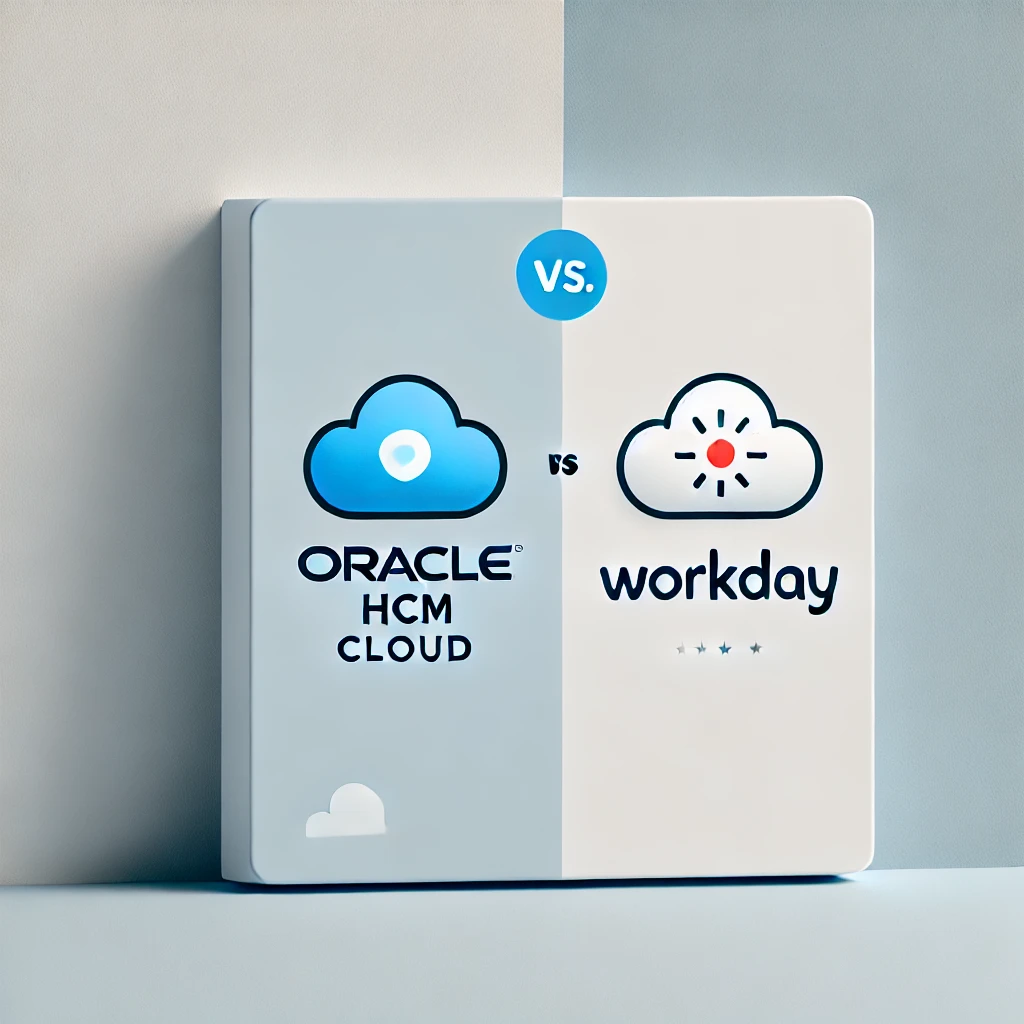Oracle HCM Cloud vs. Workday
- Oracle HCM: High customization, integrates well with Oracle ERP.
- Workday: User-friendly, combines HR and finance, and has fast deployment.
- Target Audience: Oracle for complex, large enterprises; Workday for mid-to-large agile businesses.
- Implementation: Oracle has longer setup times, and Workday is faster.
- Cost: Workday’s subscription can be expensive for large firms.
Selecting the right Human Capital Management (HCM) solution is crucial for managing and nurturing your organization’s workforce. Two leading solutions in the market today are Oracle HCM Cloud and Workday.
Both offer extensive features for managing employee lifecycle, from recruitment to retirement, but they differ in several key aspects that can significantly impact your business.
In this comparison, we’ll examine each platform’s core features and advantages and identify which types of businesses may benefit more from it.
Oracle HCM Cloud vs. Workday

1. Overview of Oracle HCM Cloud and Workday
Oracle HCM Cloud is a comprehensive suite that provides all the tools needed to manage human resources, payroll, and talent management. It is part of the broader Oracle Cloud infrastructure, enabling deep integration with other services. The solution aims to provide a seamless experience that aligns HR processes with broader business strategies.
On the other hand, Workday is a cloud-based software that focuses on human resources and financial management. Built from the ground up for the cloud, Workday offers agility and ease of use for enterprises looking to modernize their HR and finance operations.
2. Core Features
Both platforms have a rich feature set, but each has unique strengths that might make one more suitable for your organization than the other.
Oracle HCM Cloud Core Features
- Global HR: Provides a complete view of the workforce, managing data across global offices.
- Talent Management: Includes recruiting, performance management, and succession planning tools.
- Workforce Modeling and Planning: Enables effective workforce analysis and modeling to support strategic decision-making.
- Payroll and Benefits: Features integrated payroll, which supports complex payroll processing requirements across multiple geographies.
- Integration with ERP: Deep integration with other Oracle ERP modules allows for a unified experience across finance, procurement, and more.
Workday Core Features
- Unified HR and Financial Management: This system combines HR and finance functions, providing a complete overview of personnel and financials.
- Recruiting: End-to-end recruiting process management from requisition to hire.
- Compensation Management: Provides comprehensive tools for planning compensation, bonuses, and incentives.
- Workforce Analytics: Offers real-time insights and predictive analytics to guide business decisions.
- User Experience: Built with a strong focus on intuitive user experience, making it easier for HR professionals and employees.
3. User Experience and Interface
Oracle HCM Cloud has a powerful and feature-rich interface, but it can be complex, especially for first-time users. It offers a high level of customization, which can be both an advantage and a challenge. Organizations with complex HR needs may appreciate the detailed options available, while others may find the setup and navigation a bit overwhelming.
Workday is often praised for its clean, user-friendly interface. The emphasis on usability makes it easy for employees and HR professionals to navigate without much training. Workday’s design is more intuitive, and many users appreciate its ease of adoption, especially for businesses that prioritize employee self-service and mobile access.
4. Flexibility and Scalability
- Oracle HCM Cloud is highly customizable and scalable, making it suitable for organizations with complex or unique requirements. It can handle large, multinational enterprises that need deep integration across different business areas, such as finance and supply chain management.
- Workday also offers excellent scalability, but it shines in mid-sized to large enterprises looking for agility and ease of integration. Its unified approach to HR and finance provides an end-to-end view that is very attractive for organizations undergoing rapid growth.
5. Integration Capabilities
- Oracle HCM Cloud integrates seamlessly with other Oracle applications, which is a huge advantage if your organization already uses Oracle ERP or supply chain products. It also supports integration through REST APIs and has several pre-built adapters for popular applications.
- Workday also provides robust integration capabilities, and it is known for its Workday Integration Cloud. It supports standard APIs and has pre-built connectors to integrate easily with various external systems, from payroll processors to third-party benefits providers.
6. Analytics and Reporting
Oracle HCM Cloud offers Oracle Analytics, a powerful suite of tools that allows HR leaders to make data-driven decisions. With predictive analytics, embedded intelligence, and reporting capabilities, Oracle HCM is ideal for organizations that require deep workforce insights.
Workday, too, places a significant emphasis on analytics. It offers Workday Prism Analytics, which allows organizations to bring in external data and analyze it alongside Workday data for more comprehensive insights. Workday provides pre-built reports and real-time dashboards that help HR leaders gain immediate insights.
7. Implementation and Support
- Oracle HCM Cloud implementations can take longer due to the high level of customization involved. Oracle provides various implementation partners and a well-established support network, but the complexity of the setup process can make initial deployments challenging.
- Workday is known for faster implementations due to its standardized configurations and cloud-first approach. Its strong partner network assists with deployment, and many customers report smoother transitions compared to more customized solutions like Oracle.
8. Pricing
- Oracle HCM Cloud pricing is based on a subscription model, with costs depending on the number of modules and users. Oracle often offers bundled pricing for organizations that choose multiple Oracle Cloud products, which can be a cost-saving opportunity.
- Workday uses a per-user, per-month pricing model, which makes it predictable but potentially more expensive for large organizations. Costs can escalate as more features or modules are added, and there is typically an upfront fee for implementation.
9. Pros and Cons

Oracle HCM Cloud Pros
- Deep Integration: Seamless integration with Oracle ERP and other Oracle products.
- Customization: Highly customizable to meet complex business requirements.
- Advanced Workforce Modeling: Ideal for enterprises with advanced modeling and planning needs.
Oracle HCM Cloud Cons
- Complex Interface: It requires more time to set up and learn due to the feature-rich but complex user interface.
- Longer Implementation Time: Customization capabilities can lead to longer deployment timelines.
Workday Pros
- User-Friendly Interface: Highly intuitive and easy for users to navigate, making it great for employee self-service.
- Unified HR and Finance: Combines HR and finance functions for a holistic organizational view.
- Faster Implementation: Standardized configurations often lead to quicker deployments.
Workday Cons
- Higher Cost for Large Enterprises: As more users and modules are added, costs can be prohibitive for larger organizations.
- Less Customization: Although easy to implement, it may not offer the same level of deep customization as Oracle HCM Cloud.
10. Which Platform Is Right for You?
Choosing between Oracle HCM Cloud and Workday depends on the specific needs of your organization:
- Choose Oracle HCM Cloud if You are a large enterprise with complex HR processes and existing investments in Oracle ERP. The deep integration across Oracle’s ecosystem can help you achieve a unified business strategy.
- Choose Workday if You are a mid-to-large enterprise looking for a user-friendly, agile HR and financial management system. Workday’s ease of use and shorter implementation cycle make it ideal for organizations seeking quick modernization and seamless employee engagement.
Oracle HCM Cloud vs. Workday FAQ
What are the main differences between Oracle HCM Cloud and Workday?
Oracle HCM Cloud is known for deep customization and integration with Oracle ERP, while Workday is recognized for its user-friendly interface, agility, and combined HR-finance features.
Which platform is better for large enterprises?
Oracle HCM Cloud is typically better for large enterprises with complex needs, especially if they already use Oracle ERP. Workday can also work well for larger organizations but may become costly.
How do the user experiences of Oracle HCM Cloud and Workday differ?
Oracle HCM Cloud has a feature-rich but complex interface that requires more training. Workday, on the other hand, has a simpler, more intuitive design that is easier for HR professionals and employees to use.
Which system is faster to implement, Oracle HCM Cloud or Workday?
Workday usually has a faster implementation process due to its standardized configuration approach, while Oracle HCM Cloud can take longer because of its extensive customization options.
Can Oracle HCM Cloud integrate with other business systems?
Oracle HCM Cloud integrates deeply with Oracle ERP and other Oracle products, allowing for unified business operations. It also supports integration through APIs.
Does Workday offer financial management features?
Yes, Workday combines HR and finance management into one unified solution, allowing organizations to gain a complete overview of human resources and financial data.
Which is more suitable for global HR management?
Both are suitable for global HR management, but Oracle HCM Cloud provides more advanced workforce planning and global HR features, making it a strong choice for international enterprises.
How does pricing compare between Oracle HCM Cloud and Workday?
Oracle HCM Cloud offers module-based pricing, while Workday uses a per-user, per-month model. As more users and features are added, Workday can become expensive for larger organizations.
What kind of analytics do both platforms offer?
Oracle HCM Cloud offers Oracle Analytics, which is robust for workforce insights. Workday offers Workday Prism Analytics, which allows organizations to analyze external data alongside Workday data.
Is customization possible in both Oracle HCM Cloud and Workday?
Oracle HCM Cloud is highly customizable to fit complex business needs, whereas Workday offers less customization and instead focuses on ease of use and standardized configurations.
Which system is better for employee self-service?
Workday excels in employee self-service due to its intuitive and straightforward interface, which is easy for non-technical users to navigate.
Can both platforms handle payroll and benefits?
Yes, both Oracle HCM Cloud and Workday provide payroll and benefits management. Oracle HCM is often chosen for more complex payroll needs, particularly across regions.
Which platform offers better integration with ERP systems?
Oracle HCM Cloud integrates deeply with Oracle ERP, providing a seamless finance, procurement, and HR connection. Workday also integrates well with financial systems but does not offer the same level of connection with Oracle-specific products.
How does each platform support talent management?
Both platforms support talent management, including recruiting, performance management, and succession planning. Oracle HCM Cloud has advanced talent management features, while Workday is known for its user-friendly recruiting tools.
Is Workday suitable for companies that do not need financial management?
Yes, Workday can still be a great HR solution even if the financial management module is unnecessary, especially due to its ease of use and quick adoption across teams.
